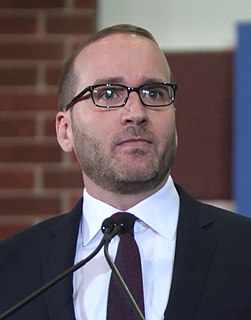A Quote by Antonin Scalia
Certainly the Constitution does not require discrimination on the basis of sex. The only issue is whether it prohibits it. It doesn't.
Quote Topics
Related Quotes
While the president is to nominate that individual [to Supreme Court], we in the Senate must provide our advice and consent. This function is not well-defined. The Constitution does not set down a road map. It does not require hearings. In fact, it does not even require questioning on your understanding of the Constitution nor the role of the Supreme Court.
The equal protection standard of the constitution has one clear and central meaning - it absolutely prohibits invidious [repugnant] discrimination by government...Under our Constitution, any official action that treats a person differently on account of his race or ethnic origin is inherently [by nature] suspect and presumptively [probably] invalid...Under the Constitution we have, one practice in which government may never engage in the practice of racism - not even "temporarily" and not even as an "experiment."
Much of the Constitution is remarkably simple and straightforward - certainly as compared to the convoluted reasoning of judges and law professors discussing what is called 'Constitutional law,' much of which has no basis in that document....The real question [for judicial nominees] is whether that nominee will follow the law or succumb to the lure of 'a living constitution,' 'evolving standards' and other lofty words meaning judicial power to reshape the law to suit their own personal preferences.
Well, I certainly hope the Democrats participate. I continue to think that some things transcend politics like the murder of four of our fellow citizens and whether or not you trust government. That is not a red or blue issue. That is an American issue. As for whether or not they boycott, I hope they don't.
Today's decision affirms what we all know to be true — the U.S. Constitution guarantees the basic civil rights of all Americans, not just some. Utah's ban on marriage equality does nothing to strengthen or protect any marriage. Instead, it singles out thousands of loving Utah families for unfair treatment simply because of who they are. Our Constitution does not allow for such blatant discrimination.
If colleges wanted to admit only legacies, or only tuba players, or only people who got astonishingly low SAT scores ' to ensure some of their graduates would be U.S. senators one day ' the Constitution wouldn't stop them. What the states, including state colleges, cannot do under the Constitution is discriminate on the basis of race.

































